Dementia: Stages, Causes, Symptoms, and Treatments
Pinpointing dementia requires a multi-step approach, combining a detailed symptom review, screening tools, and various diagnostic tests offered at iVIE. Early detection empowers patients to actively participate in their care plan and access the most effective treatments available. Meet Dr. Kourosh Naini and get your dementia screening at iVIE. For more information, contact us or book an appointment online. We are located at 11600 Washington Pl, Suit 104A, Culver City, CA 90066.
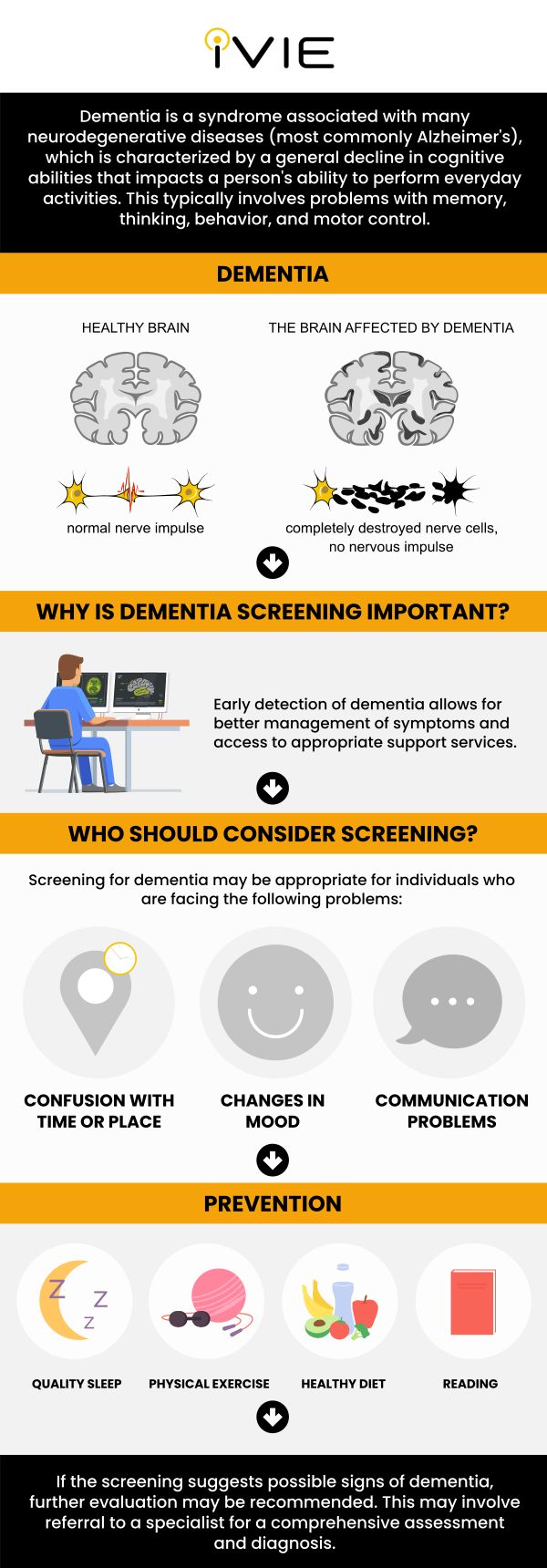
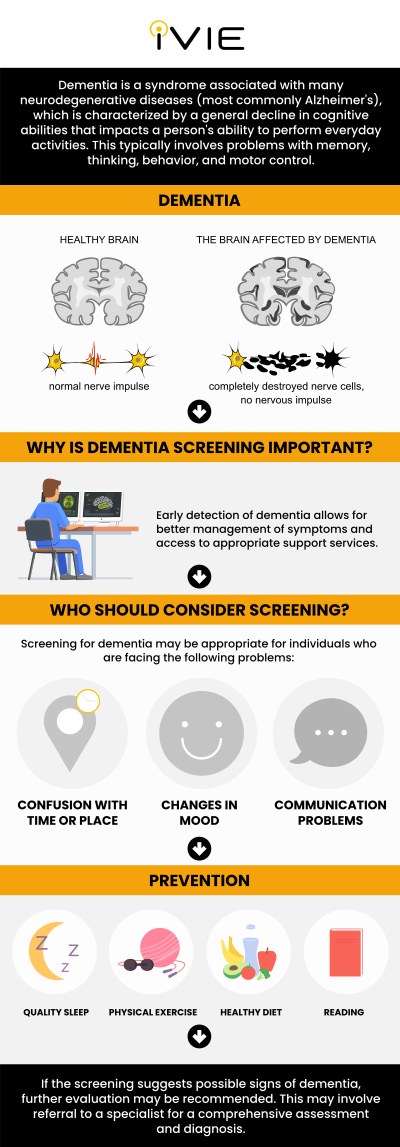
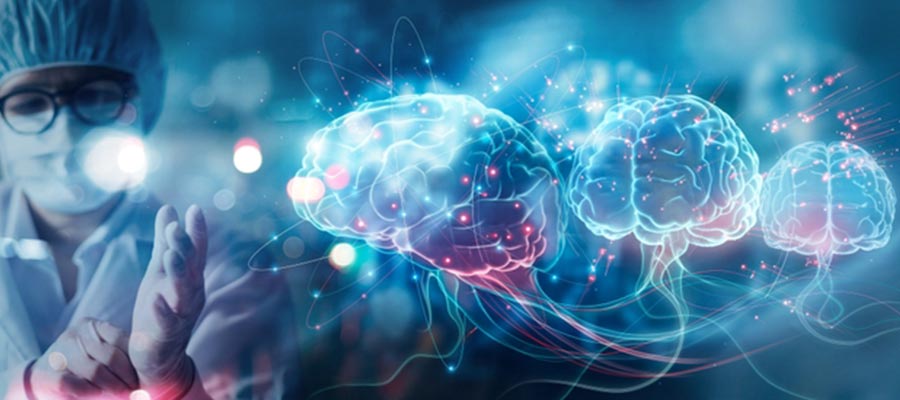

Table of Contents:
What is life expectancy with dementia?
How do dementia patients act?
How do you get checked for dementia?
What are the stages of dementia?
Dementia is a broad category of cognitive function impairment that can stem from various causes and affect individuals differently. As a result, life expectancy for someone with dementia can vary significantly depending on several factors, including the type of dementia, the individual’s overall health, when it was detected, and the treatment interventions.
Early detection and swift implementation of a treatment plan through screening services at iVIE can improve health outcomes, but there is no cure for dementia. Once diagnosed, individuals will live with the condition for the rest of their lives. Dementia progresses through different stages and can last for varying periods.
The most common type, Alzheimer’s disease, generally has a life expectancy of about eight to ten years. Other forms of dementia, such as vascular dementia, Lewy body dementia, and frontotemporal dementia, have life expectancies ranging from five to eight years.
These variations depend on the age at diagnosis and the onset of other health concerns, such as increased risk of heart attack, stroke, infections, or falls, which can further impact life expectancy.
Behavior in dementia patients can vary widely due to the different types and severities of the condition. However, common behaviors include a decline in cognitive function and various symptoms associated with different forms of dementia.
Patients may exhibit confusion, repetition, sleep issues, aggression, agitation, wandering, disinhibition, and changes in behavior like hiding and hoarding things. They might fail to recognize familiar people, places, or things and frequently ask the same questions or repeat phrases, showing general disorientation.
As the day progresses, many individuals with dementia experience an increase in symptoms, particularly in the evening, often leading to frustration and fear. They might have sleep problems and exhibit a wide range of additional symptoms depending on the type of dementia.
These can include memory loss, difficulty with language, planning issues, mood changes, and perceptual problems.
There is no single test for diagnosing dementia, it involves a comprehensive review of symptoms, screening services, and various diagnostic tests available at iVIE.
Individuals may seek testing for dementia on their own or upon the recommendation of a loved one, as recognizing the signs and symptoms independently can be challenging.
Early diagnosis allows patients to be actively involved in their treatment and healthcare choices and benefit from more effective treatments during the early stages. The screening process includes cognitive tests and functional assessments to evaluate thinking, memory, and problem-solving skills, which can be brief or more complex.
These tests measure overall cognitive functionality and impairment. A neurological exam may be performed to test coordination, strength, muscle tone, reflexes, eye movement, sensation, and speech. This component might also include brain imaging studies.
Physical examinations and diagnostic tests, including a review of the patient’s medical history, are essential to identify cognitive concerns. Brain imaging tests like MRI, CT, and PET scans, along with blood tests, may also be used to support the diagnostic process.
Dementia is divided into three stages, each with its own progression and impact on an individual’s ability to function.
Early-stage dementia typically lasts about two years and involves mild interruptions in daily activities. Symptoms can include memory loss, difficulty with language, planning issues, perception changes, mood swings, and getting lost in familiar places.
Middle-stage dementia, the longest period lasting between two to four years, often includes a more noticeable decline in functionality and an increased need for assistance. Patients might struggle to recall information, recognize loved ones, understand conversations, and may experience paranoia or hallucinations. Behavioral changes, such as increased frustration, agitation, and disturbed sleep patterns, are common. Mobility issues and difficulty performing everyday functions may require caregiver support.
Late-stage dementia usually requires full-time or additional support, lasting approximately one to two years, depending on the individual’s health and age. Symptoms in this stage are more severe. Patients might believe they are in an earlier period of their life, exhibit fear and frequent confusion, and become more prone to falling. They may spend more time in bed, have difficulty walking, swallowing, and eating, and experience incontinence and weight loss. As dementia progresses, it can weaken the immune system, leading to other medical issues like blood clots and infections.
Early identification and treatment can help manage the condition and improve the quality of life.
Dementia scanning is available at iVIE. For more information, contact us or book an appointment online. We are located at 11600 Washington Pl, Suit 104A, Culver City, CA 90066. We serve patients from Culver City Los Angeles CA, Downtown LA, Beverly Hills CA, Marina del Rey CA, Venice CA, Santa Monica CA, and surrounding areas.
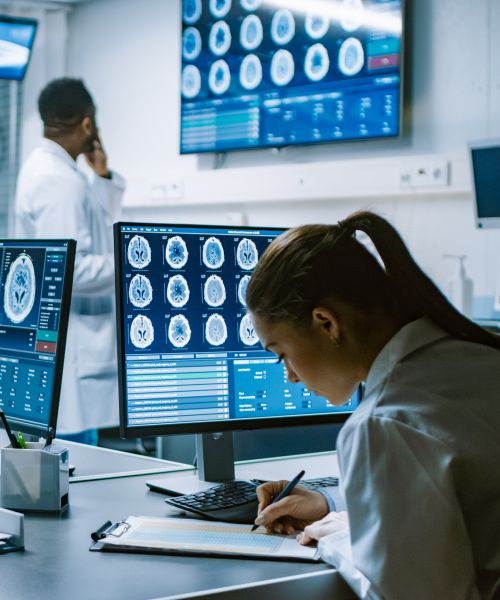
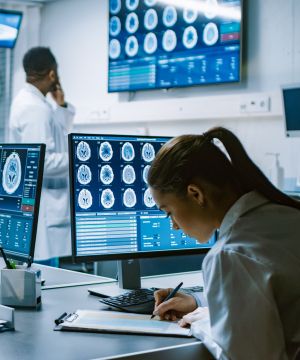
Additional Services You May Need
▸ Dementia Screening
▸ Aneurysm Screening
▸ Spine MRI
▸ Whole Body MRI Screening
▸ MRI Brain Screening
▸ Brain PET
▸ Work/Sport Spine Injury Diagnosis
▸ Work/Sport Brain Injury Diagnosis
▸ Whole Body PET For Cancer
▸ MRA Brain Screening


